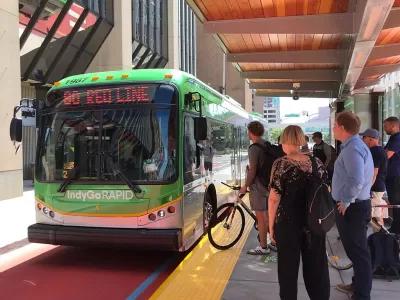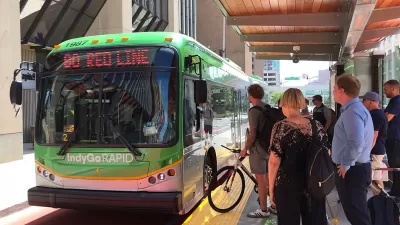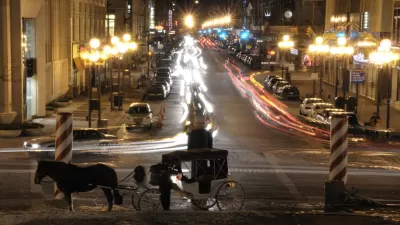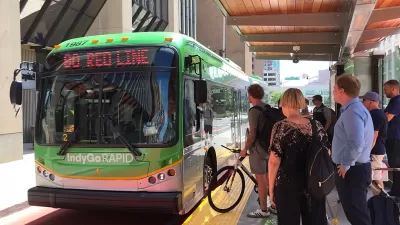IndyGo transit officials are required to match transit income tax revenue with funding from private sources, but haven't yet met that end of the bargain. A new state law would hold IndyGo accountable to those requirements.

"The Indiana Senate voted Thursday [February 27] to put teeth in a 2014 state law that required IndyGo to raise private dollars to help finance its mass transit operations, including the Red Line—something it has not done to date," reports Lesley Weidenbener.
"IndyGo officials say the legislation—which still requires final votes in the House and Senate—could significantly jeopardize its operations and its ability to build the planned Blue and Purple rapid transit lines," according to Weidenbener.
A 2014 law that, according to Weidenbener, "authorized a 0.25-percentage-point increase in the city’s income tax rate to fund IndyGo operations and new services," is the source of the controversy. That law required IndyGo to provide a 10 percent match of tax revenue with funding from private sources.
"The tax went into effect in October 2017 and is generating about $60 million per year. [State Senator Aaron] Freeman said that means IndyGo would need to raise about $6 million per year to meet the law’s threshold, but the agency has so far not raised any private money," according to Weidenbener. The 2014 law didn't include penalties if the city failed to meet that requirement, so the law proposed by Freeman last week would "require the state to withhold 10% of IndyGo’s local income tax revenue in years that it failed to meet the private funding threshold," according to Weidenbener.
Planetizen documented some of the long process of the city's adoption of the transit income tax, from approval by voters, to implementation delays and eventual approval by the City Council, to initial ridership success and ambitious plans enabled by the new revenue stream.
FULL STORY: Bill could strip IndyGo of millions of dollars, halt future work on Purple, Blue lines

Trump Administration Could Effectively End Housing Voucher Program
Federal officials are eyeing major cuts to the Section 8 program that helps millions of low-income households pay rent.

Planetizen Federal Action Tracker
A weekly monitor of how Trump’s orders and actions are impacting planners and planning in America.

Ken Jennings Launches Transit Web Series
The Jeopardy champ wants you to ride public transit.

Washington Legislature Passes Rent Increase Cap
A bill that caps rent increases at 7 percent plus inflation is headed to the governor’s desk.

From Planning to Action: How LA County Is Rethinking Climate Resilience
Chief Sustainability Officer Rita Kampalath outlines the County’s shift from planning to implementation in its climate resilience efforts, emphasizing cross-departmental coordination, updated recovery strategies, and the need for flexible funding.

New Mexico Aging Department Commits to Helping Seniors Age ‘In Place’ and ‘Autonomously’ in New Draft Plan
As New Mexico’s population of seniors continues to grow, the state’s aging department is proposing expanded initiatives to help seniors maintain their autonomy while also supporting family caregivers.
Urban Design for Planners 1: Software Tools
This six-course series explores essential urban design concepts using open source software and equips planners with the tools they need to participate fully in the urban design process.
Planning for Universal Design
Learn the tools for implementing Universal Design in planning regulations.
Heyer Gruel & Associates PA
Ada County Highway District
Institute for Housing and Urban Development Studies (IHS)
City of Grandview
Harvard GSD Executive Education
Toledo-Lucas County Plan Commissions
Salt Lake City
NYU Wagner Graduate School of Public Service





























